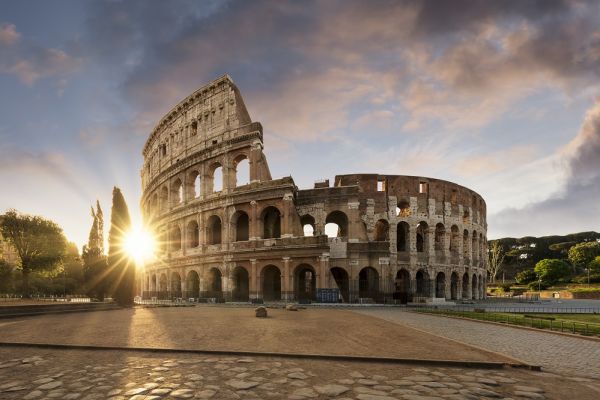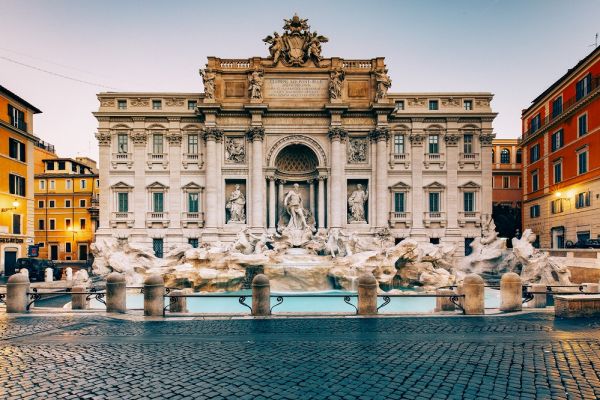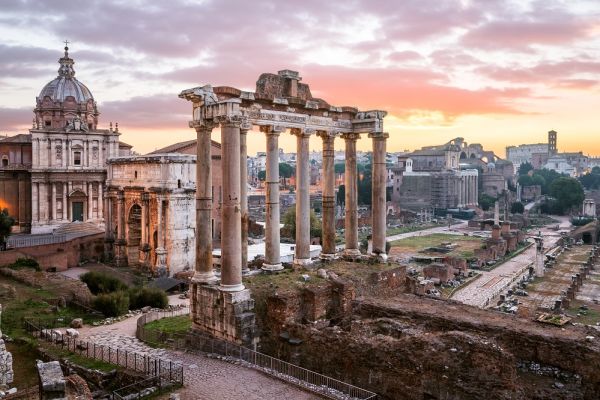RomeTravel Guide
The ancient capital of the vast Roman Empire continues to attract people from all over the world, as it has for thousands of years. Where else can you see epic ruins and Renaissance architecture in the morning, followed by Michaelangelo’s sculptures and Caravaggio’s paintings in the afternoon? Rome has art and culture in abundance, along with everything that makes an Italian holiday so wonderful: mouthwatering cuisine, great wines, gelato to-die-for, exceptional coffee and of course, a healthy appreciation for the good life.If you’re planning a visit, explore our Rome travel guide. We’ve collected the best tips from our travel experts, and have top suggestions for things to do, the best time to travel, where to stay in Rome, getting around and more. We even have a guide to Leonardo da Vinci Airport in Fiumicino (aka Rome Airport) to help you find your way.
Rome quick facts
Language
National language
Italian
Beverages
Bottle of Coke/Pepsi (330ml)
ZAR R48.15
Local time
Friday
8:32am
Currency
Euro
ZAR R1.00 = EUR €0.04
Eating out
Restaurant meal (casual dining)
ZAR R321.06
Electricity
Plug type: C
2 or 3 pins • 230V
Explore Rome
Where to stay in Rome?
With so many interesting things to see and do, it can be a challenge to decide where to stay in Rome. Thanks to the city’s numerous landmarks and places of interest, it’s not difficult to find accommodation close to the things you want to see. So, how do you decide? Apart from your budget, you should definitely consider the type of experience you want to have during your vacation. Do you want to shop ‘til you drop or indulge in the luxurious side of the city? Do you want to live like a local or immerse yourself in museums?Here are some of the best areas to stay in Rome.
You'll find most of Rome's historic landmarks at Centro Storico, an area declared as a UNESCO World Heritage site. Don't be afraid to wander around the streets – most of them are closed to traffic. You'll also find plenty of boutiques and eateries for your shopping and dining needs. Stay here if you want to be in the centre of the action.
Stay near Campo de' Fiori if you want to experience la dolce vita. By day, this piazza is a farmers' market, so you can sample fresh produce and regional specialities. At night, the square transforms as coffee bars, restaurants, and clubs open up to serve patrons. You can linger after dinner to people-watch or join them in their lively fun.
Testaccio is a rione (district) packed with character. Stay here if you want to experience a more authentic, less touristy Rome. There are plenty of restaurants serving delicious and authentic Roman food as well as bars serving drinks until dawn. Be sure to wander into the MACRO, Rome's Museum of Contemporary Art to see what today's artists have created.
There are three streets that diverge from the Piazza del Popolo, and these form the Tridente. Stay here if you want to experience Rome as a shopping mecca. Via del Corso is Rome's historic main street and the current site of many international brands. Via del Babuino and Via di Ripetta are smaller, but they pack a lot of character with local shops, eateries, and accommodation.
Locals and visitors alike consider Trastevere one of the most beautiful places to stay in Rome. Wander its narrow cobbled alleys to discover palazzos, gardens, and churches. Don't forget to go to Isola Tiberina, a small island in the middle of the Tiber. If you get hungry, just choose from the myriad interesting eateries serving authentic and delicious food.
Forever immortalised in La Dolce Vita by Federico Fellini, Via Veneto is one of the best areas to stay in Rome if you want to experience local life. Here you'll be within walking distance of famous landmarks such as the Villa Borghese. You'll also be close to the Spanish Steps, which lead down to streets that are a shopper's paradise
Believe us when we say, this is just the start. Book your Rome accommodation today!
Things to do in Rome
With so many things to do in Rome, it can be a challenge to fit it all into one holiday. The city is home to monuments like the Colosseum that have been around for thousands of years. It also has churches and palazzos full of masterpieces by Renaissance geniuses like Raphael and Bernini. Your time in Rome is sure to be enriching and enlightening.
When in Rome, you must visit two of its most famous landmarks: the Colosseum and the Roman Forum. Skip the long lines and book an advanced entry ticket. Better yet, book a tour to hear stories about these ancient monuments from knowledgeable guides. Afterwards, visit the nearby Arch of Constantine, the largest of Rome's triumphal arches.
A visit to the Basilica di San Pietro (St Peter's) is a must when you're in Rome. It holds a wealth of art and history. Inside the Vatican, you'll also find the Sistine Chapel with its ceiling and altar wall painted by Michelangelo. When visiting the Vatican, be sure to dress conservatively, check for any planned closures of St Peter's, and book your tour beforehand.
Before you leave, you must visit the Trevi Fountain. Tradition has it that when you turn your back to it and throw a coin into the fountain, you'll return to Rome. Around €3,000 worth of coins is thrown into the Trevi Fountain daily. These are collected and given to an Italian charity called Caritas.
Originally built as a temple to Mars, the Pantheon is the best-preserved ancient Roman monument. It's well-known for its dome with a hole (called an oculus) in the centre, which allows light to enter the building. In 609 AD, it was transformed into a Catholic church and remains active to this day.
In 1723, the French Ambassador wanted to symbolise his country's friendship with Spain. He did so by paying for a hill to be converted into the Spanish Steps. Today, people flock to go up and down these 135 steps. Join them and you'll find the Fontana della Barcaccia, a fountain in the shape of a boat, at the bottom.
Within the district of Trastevere, you'll find universities, Julius Caesar's villa, a botanical garden, and more. Wander the narrow alleys to discover this character-filled area. Enter the Palazzo Corsini and the Basilica of Santa Maria to see different kinds of art. Don't forget to go to the island in the middle of the Tiber River to see an old church and a hospital.
Looking for an immersive experience? Then a Rome tour is the way to go.
Rome travel tips
Don't be fazed by the long voyage and other transit stresses; knowing a couple of Rome travel tips will help you feel more confident.For instance, knowing that Rome has good drinking water from taps and fountains will save you from buying bottled water. You should also know that there's a lot of walking cobblestone streets and waiting in lines when it comes to sightseeing. So be sure to wear comfortable shoes and buy your tickets in advance whenever possible.Here's some more Rome travel advice to keep in mind.
As a part of the European Union (EU), Italy's currency is the euro (€). Each euro is divided into 100 cents, and prices often display cents after a comma. Some restaurants, shops and taxis only accept cash, which you can withdraw from bancomats (ATMs). Some vendors might offer a discount for cash payments too, so keep your credit cards for major payments.
In Italy, servers are paid a living wage and eateries may have a cover or service charge listed in the bill. Therefore, you're not expected to tip in Rome. Still, if you've been provided with excellent service and you feel that a token of your appreciation will be happily received, do tip.
From hotel staff to restaurant servers, many Italians are quite accommodating and will go out of their way to help you in English. So you don't need to worry about mastering the language in Rome. Still, it's always appreciated if you learn a few basic Italian phrases such as mi scusi (excuse me), per favore (please), and grazie (thank you).
Eateries in Italy have specific operating hours, so try to eat around the same time that the locals do. In Rome, food is served from around noon until 3pm for lunch and dinner service starts at 8pm. You don't need to eat a three-course meal every time and coffee is often drunk at the end of the meal, not with food (unless it's breakfast).
Electrical sockets in Italy are made for plugs with two or three round pins. The voltage is typically between 220V and 240V. Despite this difference, you should still be able to use your Australian devices during your Roman holiday – just be sure to pack an adapter in your luggage along with your devices.
Rome's international airport is named after the multi-talented Leonardo da Vinci. It has five terminals, each one servicing specific carriers. To get to and from the airport, there's an express train as well as fixed-fare white taxis, shuttle buses to the central terminal, and regular blue buses. If you want to ride the bus, be sure to purchase a ticket (commonly sold at tobacco stores).
Flights to Rome
Rome food and drink
As Italy's capital, you can expect Rome's food and drinks scene to have delicious and authentic fare everywhere you look. Start your mornings by downing an espresso and pastry while standing at a coffee bar. Then sample the local produce in food markets. Alternatively, grab your choice of pizza by the slice between sightseeing destinations. At night, enjoy a lingering late dinner in a restaurant by a piazza and watch revellers pass by. Finally, you can drink some Italian wine and dance at one of Rome's bars before crawling into bed and living la dolce vita again the next day.
Since all roads lead to Italy's capital, Rome food markets contain products from all over the country and the world. If you want to sample seasonal produce and regional specialities, visit the Mercato di San Cosimato. Alternatively, if you want more multicultural fare from China, India, the Middle East and more countries, go to the Nuovo Mercato Esquilino. For ready-to-eat food, stop by the Mercato di Testaccio between sightseeing destinations.
In the Eternal City, a night on the town can stretch into forever. Join the locals in their unhurried dinners that often start around 9:30pm. Then have a leisurely stroll on cobblestone streets to a coffee bar or order some digestifs at a pub. Find Rome's best bars and nightlife in Navona, Ostiense, and San Lorenzo.
Rome is one large restaurant precinct full of locals who love to eat good food. Grab pizza al taglio (by the slice) to taste different toppings, then cool off with an authentic gelato. Be sure to try fettuccine Alfredo made by the family of its original creator at Il Vero Alfredo. Save some time to wander foodie districts like Testaccio and Trastevere, where you'll find eateries serving fantastic fare.
A pilgrimage to Italy, the birthplace of espresso, is a must for any caffeine lover. Coffee in Rome is served at bars, often to patrons standing up, downing their hot drinks, and leaving. Some places have tables outside so you can enjoy a more leisurely drink with pastries. Be sure to visit well-established coffee shops such as Giolitti and Sant'Eustachio il Caffe to sample their take on coffee in Rome. Remember that coffee with milk is generally only served in the morning, espressos are commonplace for the rest of the day.
Get a real taste for the local cuisine by booking a Rome tour.
Rome through your eyes
Where to shop in Rome?
When you visit Rome, shopping should be on your to-do list. Italy is known for its high-quality goods and it would be a shame if you came home empty-handed.Wondering what to buy in Rome? Check out the leather goods, jewellery, antiques, and clothing when you're in Tridente. This shopping district comprises three main streets (Via del Corso, Via del Babuino, and Via di Ripetta) and the alleys that link them together. Rome is home to Italian designer brands as well as smaller boutiques. If you want to find a bargain, try your luck at the flea markets.
Apart from food markets such as the Mercato di Testaccio, you can also visit markets dedicated to clothes and furniture. You'll find many locals going to Porta Portese, the biggest flea market in Rome, every Sunday morning. For anyone looking for literature, art and antiques, visit the Fontanella Borghese Market. Here you'll find sellers who can tell you the history of their wares.
Although its name literally means ‘baboon's street' because of a hairy statue, Via del Babuino is actually quite sophisticated. This character-filled street is lined with Italian and international brands carrying the latest in Roman fashion. You can also browse antique stores and art galleries. If you need a new novel to read, drop by a bookstore to find some books in English.
Visit Via del Corso when you're in search of international brands. Rome's main thoroughfare is also the address of Galleria Alberto Sordi. Covered by a stained glass ceiling, this shopping and leisure centre is a great place to wander around. Via del Corso gets packed around noon, so be sure to do your shopping in the morning.
Although it's only a short street, Via Margutta is full of interesting things. This was where artists such as Caravaggio, Picasso, and Fellini resided. It's also where Gregory Peck's character in Roman Holiday lived. Today, it's lined with small local shops selling high-quality items. You'll find genuine leather goods, furniture, and jewellery all along this stretch of shops.
After walking down the Spanish Steps, keep strolling down the Via Condotti. It's an excellent place to go window shopping as the stores have interesting displays. You'll also find Italian designer brands such as Gucci, Prada, Salvatore Ferragamo, and Dolce & Gabbana. Enter their stores to get excellent customer service provided by knowledgeable staff.
Looking for a safe and simple way to bring your money when you travel? We've got you covered - check out your foreign currency options here!
Rome
Italy

Expert tip
Never accept the help of the people waiting inside airports and railway terminals offering you taxis; they are illegal operators and will charge through the nose. Go to the regulated taxi ranks - they have set fares for destinations and are strictly regulated to prevent them from charging too much.
Charlotte
Travel Expert
,,
When is the best time to travel to Rome?
From postcards and tourist videos, the weather in Rome may seem perpetually hot and sunny. However, it does vary according to the four seasons.In summer, the heat makes locals flee to more coastal towns in Italy. However, this is also the most popular time for international visitors, so touristy areas are quite busy. In autumn, the weather cools down and harvest season provides a lot of good eats in the city. Winters are chilly and wet but worth it for anyone seeking Christmas festivity. Meanwhile, springtime brings a bit of warmth as well as plenty of flowers into the city.
When in Rome for the summer, be prepared to slap on sunscreen and slide on the sunnies. July is the hottest month and temperatures can reach highs of 32°C. Many historic landmarks have long lines with little shade, so consider bringing an umbrella and plenty of water. Appropriate clothing: Loose and lightweight clothing such as shirts and shorts. Don't forget: Cover up your knees and shoulders when visiting churches.
While snowfall is extremely rare, winter in Rome can be quite chilly with average lows of 2°C. From December until February, expect rain showers that come and go. Still, spending Christmas in Rome is considered a highlight as most piazzas are full of holiday cheer. Appropriate clothing: Leather boots and a sturdy jacket. Don't forget: Locals insist on a woollen vest and a scarf to avoid the cold and the wind.
Autumn in Rome brings balmy weather averaging around 23°C. Visiting during this time of year allows you to enjoy the city without the overpowering summer heat. Instead, you'll be treated to the tail end of peak season. Appropriate clothing: Light layers that you can remove or put on as needed, such as a sweater and jeans. Don't forget: Comfortable walking shoes.
From March until June, Rome becomes warmer with average temperatures of 24°C. You'll find the city in bloom, and locals filling up the parks and gardens to celebrate the start of summer. If you're in the city to participate in the Holy Week and Easter celebrations, be sure to book your tickets and accommodation early. Appropriate clothing: Light layers. Don't forget: You can refill your bottles with water from Rome's drinking fountains.
Don't miss out. Book your Rome flight today!
How to get around Rome
The best way to explore this ancient city is undoubtedly on foot. Walking around the historic centre’s winding narrow streets allows you to see many a delight around every corner. But should you need to get further afield, there are plenty of options for getting around.
When hailing a taxi, make sure that it's official and licensed. Rome taxis should be white, with a sign on the roof, and an ‘SPQR' crest on the door. The driver should use the meter, except when travelling on a fixed-priced route (e.g. to and from the airport). Rome's taxis have cooperatives that allow you to book taxis by using an app or calling their number.
Rome has a few dedicated bicycle lanes as well as narrow alleyways and wide pavements. If you're an experienced cyclist and you want to see a new side of the city, you can rent a pushbike for a couple of hours or a few days. You can also hire motorbikes and scooters in Rome – just check the requirements of the rental companies on their website before you go.
Rome is served by a variety of public transportation options: buses, trams, subways, and local trains. You can purchase tickets from vending machines, newsstands, and tobacconists. If you're staying in Rome for at least three days, invest in a ticket that can last for a few days. You can also buy a Roma Pass, which allows you to go to different museums as well as hop on and off Rome's public transport.
Spend at least a couple of hours walking the cobbled streets of Rome. You'll find something interesting in every corner of the Eternal City, such as ancient landmarks, Renaissance fountains, and authentic cafes. Just make sure you're wearing comfortable shoes and bring a camera.
Let us help you organise your own wheels for exploring. Hire a car in Rome today!
Want to double-up your birthday voucher?
Sign up today to be the first to know about our hot holidays PLUS share the fun by referring a friend and get a R1000* on your birthday!
What are the best parks in Rome?
Visiting Rome's parks and squares provides welcome respite from the city’s bustling streets, while the city’s squares are open air art galleries – home to some of Rome’s most famous statues. Refresh your senses and relax after a long day of sightseeing at the university botanic gardens in Trastevere or the Rome Rose Garden. Drop by the piazzas (squares) to see sculptural fountains made by Renaissance masters. Rome's piazzas are also a good place to find open-air markets selling fresh produce as well as restaurants and bars – perfect for people watching late into the evening.
After enjoying the work of mankind, you can savour the work of Mother Nature at the Villa Borghese Gardens. This park, the third largest in the city, has many attractions to offer. It has a replica of Shakespeare's Globe Theatre, a water clock, a lake, and a zoo. Like Rome itself, it has plenty of statues and other artworks around to enjoy, too.
The Piazza di Spagna connects the Spanish Steps to Via Condotti and Via del Babuino, two streets dedicated to shopping. In the centre, you'll find a fountain sculpted by Pietro and Gian Lorenzo Bernini. At the southeast end of the piazza, you'll find La Colonna dell'Immacolata, a monument of the Virgin Mary with various biblical figures at the base.
One of Rome's biggest squares is actually circular in shape. The Piazza del Popolo lies at the top of the trident streets: Via del Corso, Via di Ripetta, and Via del Babuino. It's surrounded by churches and areas of greenery. An Egyptian obelisk stands tall in the centre of Piazza del Popolo while fountains and statues are scattered around it.
Built over an ancient racetrack, the Piazza Navona is an elegant oval surrounded by palazzos and churches. You'll find three magnificent fountains that add to the beauty of the piazza. The Fontana dei Quattro Fiumi (Fountain of the Four Rivers) is at the centre. Meanwhile, the Fontana del Moro (Moor Fountain) lies south and the Fontana di Nettuno (Fountain of Neptune) is at the northern end.
On most mornings except Sundays, you can find a farmers' market at Campo de'Fiori. This is one of if not the oldest market in Rome. It's known for its fresh fruits, veggies, meats, seafood, and other produce. At night, this piazza turns into a lively spot for dinner and drinks. At the centre of Campo de'Fiori stands a large statue of a philosopher, Giordano Bruno.
The Piazza di Pasquino holds the first and most popular of Rome's talking statues. The crumbling figure was named ‘Pasquino' after a famously witty tailor who worked in the area. Since the early 16th century, locals have been anonymously posting poems, witticisms and political commentary on or near the statue. Come to the piazza to see what Pasquino has to say.
Getting from park to park is so much better with your own wheels. Hitch your ride now!










